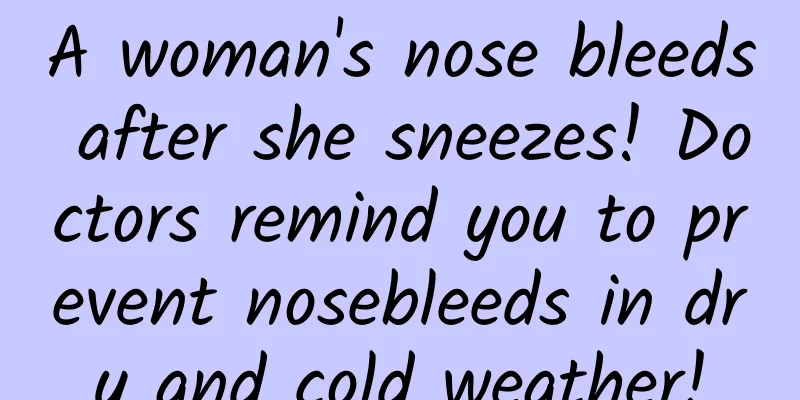A woman's nose bleeds after she sneezes! Doctors remind you to prevent nosebleeds in dry and cold weather!

|
Ms. Peng, 54, from Changsha, couldn't stop her nose bleeding after sneezing, so she went to the Department of Otolaryngology and Head and Neck Surgery III of Hunan Provincial People's Hospital for treatment. Director Wang Ning found the bleeding point under nasal endoscopy and performed packing to stop the bleeding. ▲Ms. Peng undergoes nasal endoscopy Ms. Peng said that every autumn and winter, her nose would be particularly dry, and she would pick her nose with her hands from time to time, causing frequent nose bleeding. Usually the bleeding would stop in a short time, so she didn't take it too seriously. But this time, the bleeding lasted for nearly an hour and she didn't take it too seriously, so she came to the hospital for treatment. Director Wang Ning found that not only did Ms. Peng have severe congestion and erosion of the front mucosa of both sides of the nasal cavity, but she also had the bad habit of picking and rubbing her nose. She had also been taking antiplatelet drugs recently. He diagnosed that this nosebleed was caused by dryness of the nasal cavity, and taking antiplatelet drugs was an important factor leading to her continuous bleeding. Director Wang Ning said that winter is a dry season with low humidity in the air, which makes the capillaries in the nasal cavity less moisturized, making it a frequent season for nosebleeds. In the past three days alone, the Otolaryngology and Head and Neck Surgery Clinic of Mawangdui Campus of Hunan Provincial People's Hospital has received more than ten patients with nosebleeds. He said that nosebleed is one of the common emergencies in otolaryngology. Most people believe that nosebleed is caused by damage to the nasal mucosa, and they simply "block it" when it occurs, ignoring the diagnosis of the cause of nosebleed, leading to repeated nosebleeds or delaying the treatment of the primary disease. ▲Director Wang Ning receives Ms. Peng Director Wang Ning said that the common causes of nosebleeds are as follows: climate changes at the turn of winter and spring, and spring and summer, with sudden changes of temperature, which causes the capillaries in the nose to contract and dilate, making them prone to rupture and bleeding; frequent nose picking, nose rubbing, falls, collisions, etc.; acute and chronic rhinitis, acute and chronic sinusitis, etc., nasal inflammation can repeatedly irritate the nasal mucosa, leading to nosebleeds; long-term retention of foreign objects in the nasal cavity, leading to erosion of the nasal mucosa; nasal and sinus tumors; and other causes such as high blood pressure, coagulation disorders, or fragile blood vessels may all cause nosebleeds. Director Wang Ning reminds that if nose bleeding occurs, try not to panic, stay calm, and avoid excessive fluctuations in blood pressure that may aggravate the bleeding. Different methods of hemostasis can be selected according to the severity of the nose bleeding, the site of bleeding, the amount of bleeding, and the cause. 1. Finger pressure method: It is suitable for bleeding in the front of the nasal cavity, especially for children and adolescents. The method is: the patient sits down with the head slightly tilted forward, presses the nose wing on the bleeding side with fingers or pinches both nostrils for 10 to 15 minutes, and asks the patient to spit out the blood in the mouth to avoid accidental swallowing. 2. Ice compress method: Use crushed ice or an ice towel to cool the neck and forehead. By lowering the local temperature, it will cause blood vessel contraction and achieve the effect of stopping bleeding. 3. If nose bleeding still cannot be controlled, you should immediately visit an ENT department for further hemostasis treatment to prevent shock caused by excessive bleeding. Director Wang Ning pointed out that the following points should be noted to prevent nose bleeding: 1. For those with dry nasal cavity or in dry climate, use a humidifier or saline nasal spray to increase the moisture of nasal mucosa, and use Chinese herbal nasal oil drops to protect the nasal mucosa. 2. Avoid bad habits of picking the nose and blowing the nose hard, and correct children's bad habits of picking the nose, rubbing the nose, and stuffing foreign objects into the nasal cavity. 3. Eat a balanced and light diet and avoid vitamin deficiency. 4. Actively treat primary nasal diseases such as rhinitis and sinusitis. Middle-aged and elderly people with underlying diseases should take antihypertensive drugs as prescribed by the doctor to control their blood pressure. 5. Avoid indiscriminate use and abuse of nasal sprays. Hunan Medical Chat Special Author: Xiao Li, Department of Otolaryngology, Hunan Provincial People's Hospital Follow @湖南医聊 to get more health science information! (Edited by YT) |
<<: Cough cough cough...Battle to defend "Lung City"
Recommend
How to match short boots
Every girl has boots, and there are many types of...
Shock! The fatal danger behind Sichuan and Chongqing's "red" glutinous rice balls, do you still dare to eat them?
There is a saying in some areas of Sichuan and Ch...
What should girls eat to be good for their skin?
Girls pay special attention to skin care and even...
How to correct pelvic deviation
If you find yourself lying on your back in bed wi...
The most obvious symptoms of hyperthyroidism in women
The thyroid gland grows in the human neck. It is ...
Nursing diagnosis of pelvic inflammatory disease
Pelvic inflammatory disease is a serious gynecolo...
How to cook eggs deliciously, nutritiously and simply? You can't eat more than a few eggs a day
Eggs, also known as chicken eggs or chicken eggs,...
Will the clutch become hard if you often drive in low gear? Under what circumstances will the clutch become hard?
When it comes to our car driving, especially manu...
What should I do if I have dry mouth, tongue, back pain during menstruation?
Menstruation is a very important period for women...
Can a mother still breastfeed if she has diarrhea?
Many women experience diarrhea during breastfeedi...
What is the nutritional value of seabed animals? What are the small animals on the seabed?
Marine life is a treasure trove of inorganic salt...
What is the fetal movement at 18 weeks of pregnancy?
During pregnancy, every woman is always concerned...
What medicine should I take for irregular uterine bleeding?
For abnormal uterine bleeding, patients must go t...
Can I eat donkey-hide gelatin cake during confinement?
Regardless of whether the pregnant woman chooses ...
What should women do if they have lower abdominal pain due to a cold?
Many women accidentally catch a cold during menst...









